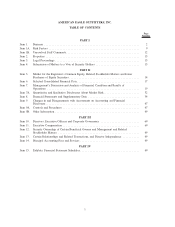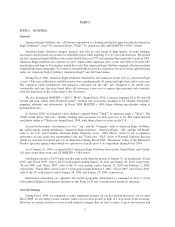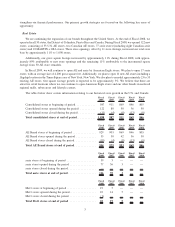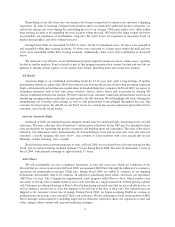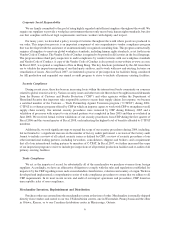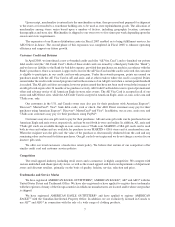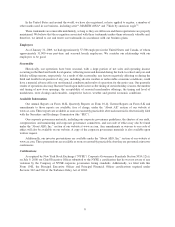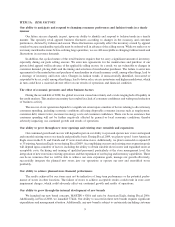American Eagle Outfitters 2008 Annual Report Download - page 13
Download and view the complete annual report
Please find page 13 of the 2008 American Eagle Outfitters annual report below. You can navigate through the pages in the report by either clicking on the pages listed below, or by using the keyword search tool below to find specific information within the annual report.our key vendors and plan for contingencies, the financial failure of a key vendor could disrupt our operations and
have an adverse effect on our cash flows, results of operations and financial condition.
Seasonality
Historically, our operations have been seasonal, with a large portion of net sales and operating income
occurring in the third and fourth fiscal quarter, reflecting increased demand during the back-to-school and year-end
holiday selling seasons, respectively. As a result of this seasonality, any factors negatively affecting us during the
third and fourth fiscal quarters of any year, including adverse weather or unfavorable economic conditions, could
have a material adverse effect on our financial condition and results of operations for the entire year. Our quarterly
results of operations also may fluctuate based upon such factors as the timing of certain holiday seasons, the number
and timing of new store openings, the acceptability of seasonal merchandise offerings, the timing and level of
markdowns, store closings and remodels, competitive factors, weather and general economic conditions.
Our reliance on key personnel
Our success depends to a significant extent upon the continued services of our key personnel, including senior
management, as well as our ability to attract and retain qualified key personnel and skilled employees in the future.
Our operations could be adversely affected if, for any reason, one or more key executive officers ceased to be active
in our management.
Our ability to successfully complete important infrastructure projects
We implemented multiple infrastructure projects in Fiscal 2008 and will continue to implement new projects in
Fiscal 2009. The major projects in Fiscal 2009 include:
• the construction and opening of our 25,000 square foot flagship store in the Times Square area of New York,
New York; and
• the construction and integration of the second phase of our new corporate headquarters in Pittsburgh,
Pennsylvania.
We rely upon our facilities and information systems to support the management of our operations. Any delays
or difficulties in these important projects could have a material adverse impact on our business.
Failure to comply with regulatory requirements
As a public company, we are subject to numerous regulatory requirements. Our policies, procedures and
internal controls are designed to comply with all applicable laws and regulations, including those imposed by the
Sarbanes-Oxley Act of 2002, the SEC and the NYSE. Failure to comply with such laws and regulations could have a
material adverse effect on our reputation, financial condition and on the market price of our common stock.
Negative conditions in global credit markets may further impair our investment securities portfolio.
Auction rate securities (“ARS”) are long-term debt instruments with interest rates reset through periodic short-
term auctions. Holders of ARS can either sell into the auctions; bid based on a desired interest rate or hold and
accept the reset rate. If there are insufficient buyers, then the auction fails and holders are unable to liquidate their
investment through the auction. A failed auction is not a default of the debt instrument, but does set a new interest
rate in accordance with the original terms of the debt instrument. The result of a failed auction is that the ARS
continues to pay interest in accordance with its terms; however, liquidity for holders is limited until there is a
successful auction or until such time as another market for ARS develops. ARS are generally callable at any time by
the issuer. Auctions continue to be held as scheduled until the ARS matures or until it is called.
As a result of the global recession, we have been unable to liquidate our holdings of certain ARS because the
amount of securities submitted for sale has exceeded the amount of purchase orders for such securities and the
auctions failed. For failed auctions, we continue to earn interest on these investments at the contractual rate. In the
11


